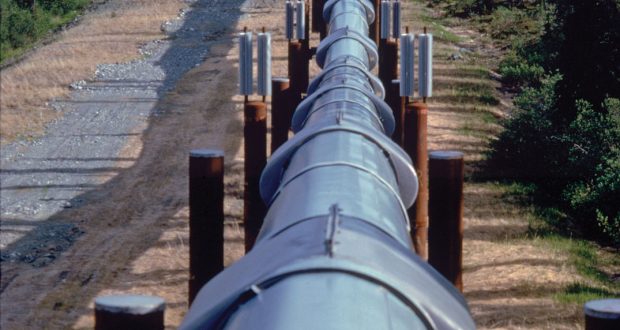Nigeria, Algeria and Niger Republic on Monday moved to reactivate the $13 billion Trans- Saharan Natural Gas Pipeline (TNGP) project as demand pressure continues to mount from within the continent and Europe.
A planned natural gas pipeline from Nigeria to Algeria, the idea of the trans-Saharan pipeline was first proposed in the 1970s and the project was first seen as an opportunity to diversify the European Union’s gas supplies.
In 2002, the Nigerian National Petroleum Company (NNPC) Ltd., and the Algerian national oil and gas company, Sonatrach signed a Memorandum of Understanding (MoU) while the feasibility study was completed in September 2006.
The pipeline, of which the Nigerian section has been named the Ajaokuta-Kaduna-Kano, starts from Warri and runs north through Niger to Hassi R’Mel in Algeria where it will connect the existing Trans-Mediterranean, Maghreb–Europe, Medgaz and Galsi pipelines.
With an approximate length of 4,128 kilometres, including 1,037 kilometres in Nigeria, 841 kilometres in Niger, and 2,310 kilometres in Algeria, the annual capacity of the pipeline is estimated to be up to 30 billion cubic meters of natural gas.
Speaking during a meeting with ministers of energy of participating nations on the revamping of the project in Abuja, Minister of State, Petroleum, Mr Timipre Sylva, noted that the completion of the project was long overdue.
He stated that the project which has been on the drawing board for years, needed to be actualised, especially given that gas prices have skyrocketed.
He added that with pressure from Europe to ramp up supply to the continent against the backdrop of the Russia-Ukraine war, given that gas has become a weapon of international war, has become critical.
More than ever before, Sylva noted that the project needed to be fast-tracked, stressing that on the side of Nigeria, the AKK was already in full swing.
“We as Africans should show the world that we can come together and build major infrastructure like the TNGP to signal that Africa has come of age because this kind of regional integration project is the kind that the world wants to see,” he noted.
Sylva stressed that a lot of financing organisations were interested in the project, describing it as a very viable one with Nigeria’s proven reserve of roughly 206 TCF and an upside of 600TCF.
According to him, when the gas from Niger, Algeria and Niger are properly harnessed, it will add significantly to world supply and put the continent on the world map.
“This is the beginning and we would like to see this as the last mile of this project so that we can actualise the project as soon as possible,” the minister stated.
In his comments, the Algerian Minister of Energy and Mines, Mohamed Arkab, noted that the TSGP will have a significant and positive impact on the socio-economic development of African countries.
He explained that the reactivation of the project would help achieve carbon neutrality in the short term, but added that a global and efficient energy transition cannot take place without the contribution of hydrocarbons.
“The TSGP project is in line with our national objectives and our international commitments in reducing the carbon footprint and securing the supply of natural gas to markets.
“The TSGP presents itself as a new source of supply for markets whose demand is constantly growing, given the place that natural gas will occupy in the future energy mix.
“Counting on the know-how of our countries in production, transport and marketing fields, it is obvious that the TSGP project, with the advantages it can provide, will further strengthen our production capacities and enhance our capabilities to play a major role in the international markets,” he said.
Among others, he said the advantages of the development that the project will bring to the local populations and to the various transit regions are a route crossing three countries and which able to interconnect other countries.
He invited all the parties and teams to participate actively in the realisation of the important project, within the required deadlines, to ensure the supply of the markets and make sure of a a better positioning of African countries in the chessboard world of energy transition and sustainable development.
Also in his remarks, the Group Executive Director, Gas and Power, Mr Abdulkabir Ahmed, who represented the Group Managing Director of the NNPC, Mallam Mele Kyari, pledged Nigeria’s commitment to seeing the project to a logical conclusion.
He said that the NNPC will ensure that the resources needed to make the project a success will be made available, pointing out that the gas that will flow into the pipelines will be made available in due time.
“The only way to commercialise this gas is to provide it for the market and you cannot find a market if you don’t get it in the pipelines. Therefore, the TNGP is important and we also want to put it on record that funding remains important to the success of this project.
“ This project will curtail desertification, grow domestic economies,” he assured, adding that the ministers wills decide whether the MoU earlier entered still holds.
Also speaking, Niger’s SONIDEP head, Ibrahim Mamane, stressed that the country was ready to operate in the upstream sector, adding that Niger has a very huge potential in the sector.




